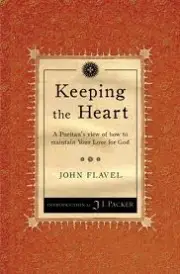Keeping The Heart
‘The eye of God is, and the eye of the Christian ought to be, principally fixed upon the heart.’
With that bold statement so begins John Flavel’s ‘Keeping the Heart’, which Christian Focus have reprinted in time for it to be one of the exit–books at EMA 2012 last month. Flavel was an English Puritan in the seventeenth century, and this fairly short work, first published in 1668 as ‘A Saint Indeed’, is essentially an extended exposition of Proverbs chapter 4, verse 23, ‘keep your heart with all vigilance, for from it flow the springs of life’.
You can pick up books on how a Christian should act in all kinds of matters, but Flavel argues that there is nothing more important than for a Christian to be aware of their own heart. By ‘heart’ Flavel simply means the inner person, who we really are, and he proceeds to dispense with great care and consideration a meticulous probing of what we’re about: our motivations, desires, affections. Unsurprisingly Flavel is crystal clear that we first need our hearts to be regenerated by God as we hear the gospel and respond in faith, i.e. we need to be converted. But as Christians with ‘new hearts’ we must seek to ‘keep them’, i.e. guard them, rooting out sinful thought and fixing them upon God, and this is the task to which Flavel urges us. So striking is his emphasis, that I found myself naturally comparing it with our culture, and feeling that in a lot of our modern Christianity we allow our hearts to roam pretty much unchecked. How often do I inspect my own motivations? How often do I examine that thought–process, or consider why I acted the way I did in that situation?
But not only does Flavel focus on the heart rather than externals, it also becomes evident that he is particularly perceptive in grasping the way our hearts work. The Puritans are often known as ‘doctors of the soul’, and as you read Flavel you can see why the nickname is deserved. The bulk of the book is the third section, ‘Special Seasons in the Life of a Christian which Require our Utmost Diligence in Keeping the Heart’. For me, this is where his understanding of our hearts really shines through. To give you a sample of these seasons, he picks out ‘the time of prosperity’, ‘the time of adversity’, and ‘the time of doubting and of spiritual darkness’, as well as eight others. With each season he flags up particular temptations to which our hearts may be especially vulnerable, and particular truths that our hearts need to keep especially close.
I’ve found it a very helpful wake–up call to the importance of watching the motivations and desires of my own heart. It is amazing, when you stop to think about it, that we could ever envisage ‘religion’ to consist simply of external actions and performance or, worse still, that these could be a means by which God’s favour rests upon us! Such a stance completely bypasses our hearts, and thus conveniently evades the question of whether there is anything in our affections and desires that just might suggest otherwise! We need to get real, and desire for God to transform even the most inner part of us.
Because of its pastoral and personal nature, I imagine this book is the kind from which real benefit comes as I dip back into it time and time again, particularly as I’m now alert to the reality that each season of my life will bring with it different ‘heart–challenges’. But ultimately Flavel has shown me afresh the magnitude of my hearts affect upon all else that I do. He is arguing for us to be people who are in ‘frequent observation of the frame of the heart’, and that means I need to make changes, from the way I approach my daily ‘quiet time’, to being more self–aware in particular conversations, to how I review each day.
I recommend it as good medicine for the soul.
Robin Ham






